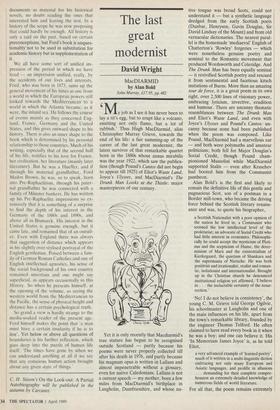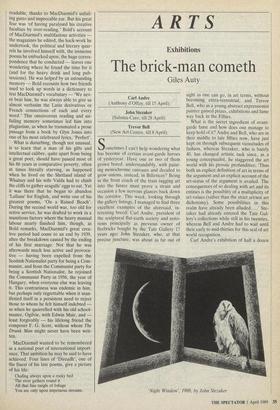The last great modernist
David Wright
MacDIARMID by Alan Bold
John Murray, £17.95, pp.482
My job as I see it has never been to lay a tit's egg, but to erupt like a volcano, emitting not only flame, but a lot of rubbish.' Thus Hugh MacDiarmid, alias Christopher Murray Grieve, towards the end of his life: a fair summing-up of the career of the last great modernist, the latest survivor of that remarkable quartet born in the 1880s whose annus mirabilis was the year 1922, which saw the publica- tion (though Pound's Cantos did not begin to appear till 1925) of Eliot's Waste Land, Joyce's Ulysses, and MacDiarmid's The Drunk Man Looks at the Thistle: major masterpieces of our century.
Yet it is only recently that Macdiarmid's true stature has begun to be recognised outside Scotland — partly because his poems were never properly collected till after his death in 1976, and partly because his magnum opus is written in Lallans and almost impenetrable without a glossary, even for native Caledonians. Lallans is not a current speech — my mother, born a few miles from MacDiarmid's birthplace in Langholm, Dumfriesshire, and whose na-
tive tongue was broad Scots, could not understand it — but a synthetic language dredged from the early Scottish poets (Dunbar, Henryson, Gavin Douglas, Sir David Lindsay of the Mount) and from old vernacular dictionaries. The nearest paral- lel is the homemade 'mediaeval' English of Chatterton's 'Rowley' forgeries — which were nonetheless genuine poetry and seminal to the Romantic movement that produced Wordsworth and Coleridge. And The Drunk Man has been equally seminal
it revivified Scottish poetry and rescued it from sentimental and facetious kitsch imitations of Burns. More than an amazing tour de force, it is a great poem in its own right, over 2,500 lines of visionary power, embracing lyricism, invective, erudition and humour. There are uncanny thematic resemblances between The Drunk Man and Eliot's Waste Land, and even with Joyce's Ulysses and Pound's Cantos: un- canny because none had been published when the poem was composed. Like Pound, MacDiarmid had a marvellous ear — and both were polymaths and amateur politicians; both fell for Major Douglas's Social Credit, though Pound cham- pionioned Mussolini while MacDiarmid supported Stalin — even after Kruschev had booted him from the Communist pantheon.
Alan Bold's is the first and likely to remain the definitive life of this gentle and pugnacious Scot, son of a postman in a Border mill-town, who became the driving force behind the Scottish literary renaiss- ance and was, to quote his biographer,
a Scottish Nationalist with a poor opinion of the nation he lived in; a Communist who scorned the low intellectual level of the proletariat; an advocate of Social Credit who had little interest in economics. Philosophi- cally he could accept the mysticism of Ploti- nus and the scepticism of Hume, the deter- minism of Marx and the existentialism of Kierkegaard, the quietism of Shankara and the supermania of Nietzche. He was both positivist and irrationalist, realist and roman- tic, isolationist and internationalist. Brought up in the Christian church he denounced institutional religion yet affirmed, 'I believe in . . . the ineluctable certainty of the resur- rection.'
`No! I do not believe in consistency', the young C. M. Grieve told George Ogilvie, his schoolmaster at Langholm and one of the main influences on his life, apart from the town's remarkable library, founded by the engineer Thomas Telford. He often claimed to have read every book in it when he was a boy; and one can believe it. His `In Memoriam James Joyce' is, as he told Eliot,
a very advanced example of 'learned poetry', much of it written in a multi-linguistic diction embracing not only many European and Asiatic languages, and prolific in allusions . . . demanding for their complete compre- hension an extremely detailed knowledge of numerous fields of world literature.
For all that, the poem remains extremely
readable, thanks to MacDiarmid's unfail- ing gusto and impeccable ear. But his great fear was 'of having paralysed his creative faculties by over-reading.' Bold's account of MacDiarmid's multifarious activities the magazines he edited, the hack-work he undertook, the political and literary quar- rels he involved himself with, the immense poems he embarked upon, the huge corres- pondence that he conducted — leaves one wondering where he found the time for it (and for the heavy drink and long pub- sessions). He was helped by an astounding memory — Bold recounts how two friends used to look up words in a dictionary to test MacDiarmid's vocabulary — 'We nev- er beat him, he was always able to give us almost verbatim the Latin derivatives or French connections of each and every word.' This omnivorous reading and un- failing memory sometimes led him into plagiarism, as when he transmuted a prose passage from a book by Glyn Jones into one of his most celebrated lyrics, 'Perfect'.
What is disturbing, though not unusual, is to learn that a man of his gifts and intellectual calibre, quite apart from being a great poet, should have passed most of his 86 years in comparative poverty, often at times literally starving, as happened when he lived on the Shetland island of Whalsay and his wife Valda had to climb the cliffs to gather seagulls' eggs to eat. Yet it was there that he began to abandon `Lallans' for English, and write one of his greatest poems, 'On a Raised Beach'. During the second world war, too old for active service, he was drafted to work in a munitions factory where the heavy manual labour nearly finished him, though, as Bold remarks, MacDiarmid's great crea- tive period had come to an end by 1939, after the breakdown caused by the ending of his first marriage. Not that he was afterwards much less active and provoca- tive — having been expelled from the Scottish Nationalist party for being a Com- munist, and from the Communist party for being a Scottish Nationalist, he rejoined the Communist Party in 1956, the year of Hungary, when everyone else was leaving it. This contrariness was endemic in him, but perhaps only regrettable when it man- ifested itself in a persistent need to reject those to whom he felt himself indebted as when he quarrelled with his old school- master, Ogilvie, with Edwin Muir, and least forgivably — his lifelong friend the composer F. G. Scott, without whom The Drunk Man might never have been writ- ten.
MacDiarmid wanted to be remembered as a national poet of international import- ance. That ambition he may be said to have achieved. Four lines of Direadh', one of the finest of his late poems, give a picture of his life:
Chafing always upon a rocky bed The river gathers round it All that fine tangle of foliage You see only upon impetuous streams.



















































 Previous page
Previous page